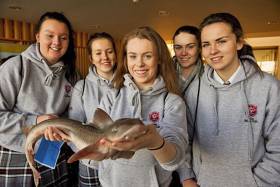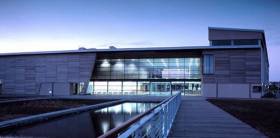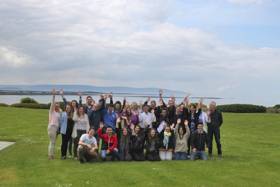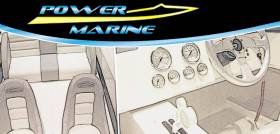Displaying items by tag: jobs
Open Day For All At Marine Institute This Week
#MarineScience - The Marine Institute welcomed over 250 visitors to its headquarters in Oranmore for the maritime innovation agency’s annual open day on Wednesday (23 November).
Organised as part of the Galway Science & Technology Festival and designed mainly for Transition Year students, this year the Marine Institute decided to open its doors to all, and attracted Leaving Cert students, teachers and parents, plus university and community groups from across the country.
Visitors had the opportunity to tour the state-of-the-art facilities in Oranmore and to meet with researchers and scientists and hear about their careers in the marine sector, which already supports over 30,000 direct and indirect jobs.
The institute also organised a series of interactive exhibitions to introduce visitors to some of the innovative work happening in areas including seabed mapping, research vessel operations and oceanography, as well as fisheries and the marine environment.
Find out more about the Marine Institute and its work at the Galway and Science & Technology Festival Exhibition this Sunday 27 November at NUI Galway from 10am till 6pm.
Minister Confirms Course Approval As TD Cites 'Bad Blood' Between Maritime College & MSO
#CourseDispute - Controversy over the approval of maritime college courses "raises questions" about Ireland's marine authorities, says a Donegal TD.
As Donegal Now reports, Thomas Pringle was speaking in the Dáil after Transport Minister Shane Ross confirmed some 400 seafarers who graduated a refresher training course at the National Maritime College of Ireland (NMCI) would have their qualifications recognised by the Marine Survey Office (MSO).
All mariners are required to have completed the refresher training by 1 January next year – but the NMCI says the MSO refused to accredit its relevant course despite approval being sought at least 18 months ago.
Deputy Pringle noted that the NMCI "still hasn’t heard from the MSO. The minister confirmed there is bad blood between the office and the maritime college.
"If this is the case, this is not normal and raises questions around capacity of the office to administer marine matters.”
Donegal Now has more on the story HERE.
IFI Recruiting Fish Community Modeller
#Jobs - Inland Fisheries Ireland (IFI) is recruiting a Fish Community Modeller on a temporary basis (circa 18 months) to work in its research department based in Citywest with occasional requirement to travel to Queens University Belfast (QUB) as part of the role.
The successful candidate will report to a senior research officer and will be tasked with developing a realistic mathematical model of predator-prey interactions in lake fish communities.
The model will take account of existing knowledge relating to focal species, including population dynamics, life-history strategies, feeding ecology, behaviour and physiology and will be used to evaluate the ecological consequences of fisheries management strategies.
They will also be required to contribute to publication of peer review papers and disseminate results at conferences and stakeholder groups; to add to modelling capacity at IFI and contribute to relevant research activities as appropriate; and to participate in the fisheries modelling group at QUB.
The successful applicant will be expected to:
- Quickly understand the management context of the project and available data.
- Design, build in software and test a two-species model of fish population dynamics.
- Interact productively with staff in the IFI research team and contribute to the fisheries modelling group at QUB.
- Produce publications and material to support and promote the correct use of the model in fisheries management and policy.
- Have proven ability to build and test quantitative computation models in software, including coding in at least one third-generation language (C, C++, etc) and a mathematical scripting language (Matlab, R, etc).
- Perform other duties as may be allocated by the senior research Officer or his/her nominee.
- Have a Bachelor's degree in a relevant area.
- Be available from 1 September 2016.
- Have a full driving licence valid in the State.
The successful candidate will ideally possess:
- A PhD in a relevant area.
- Evidence of successful peer review publication.
- Excellent interpersonal skills with an emphasis on communication of science to diverse stakeholders.
This is a temporary appointment, estimated to be for a period of 18 months. Salary range is on the HEO Salary Scale (as of 1 November 2013), €40,675-€57,405, 11-point scale including 2 LSIs (appointment will be made on the first point of the scale).
Applications for this role should be submitted in the form of a cover letter and CV quoting reference ‘Modeller’ to [email protected] by 5pm on Monday 18 July 2016.
Applications will be shortlisted on the basis of information provided in the cover letter and CV. Late applications will not be accepted. Canvassing will disqualify. Inland Fisheries Ireland is an equal opportunities employer.
Marine Institute Summer Bursar Programme Returns
#MarineInstitute - The annual Marine Institute bursar programme begins this month with 28 students from various third-level institutions starting summer work placements.
Over eight weeks, the students will work in a variety of areas including salmon assessments, fish sampling at the ports, shellfish assessment, maritime economics, education, application development and oceanographic sciences.
"The work experience programme gives students from a wide variety of disciplines a chance to further their knowledge and research in their particular area of interest and to expand their professional networks within Ireland and internationally," said Helen McCormick, senior laboratory analyst at the Marine Institute and co-ordinator of the bursar programme.
As previously reported on Afloat.ie, the placements will give students practical and hands-on experience at different locations around Ireland, including the offices and laboratories at the Marine Institute, Galway; Wilton Place, Dublin; and Burrishoole Catchment, Newport, Co Mayo. Some students will also be located at other locations around the country in counties Cork, Limerick, Derry and Waterford.
The summer bursar programme has been ongoing since the 1960s and is a highly sought-after work experience programme in the marine science sector and continues to offer a promising gateway into the expanding areas of marine science and research in Ireland.
Dr Peter Heffernan, CEO of the Marine Institute, congratulated all successful bursars on this year's programme. "The Institute is delighted to support this excellent learning opportunity for Irish students as well as highlight the future employment opportunities for undergraduates and postgraduates within the marine sector," he said.
Inland Fisheries Ireland Seeks Logistics Manager
#Jobs - Inland Fisheries Ireland (IFI) is seeking applications from suitably qualified candidate for the position of logistics manager.
Reporting to the head of business development, the appointee will be responsible for overseeing and delivery of a comprehensive logistics function in a number of key areas for the State agency responsible for the protection, management and conservation of Ireland’s inland fisheries and sea angling resources.
These areas include facilities, warehouse and equipment management, asset management, particularly in the area of vehicle and boat fleets.
The appointee will oversee IFI’s tendering and purchasing processes, together with the implementation and maintenance of best practices logistics management throughout the organisation.
Applicants must have a third level qualification in a relevant discipline (ie Logistics; Transport Management; Supply Chain Management; Business Management or equivalent).
The appointee will have 5-7 years' experience in the logistics field with a proven track record in a logistics management role within a service related environment. In addition the person appointed will possess experience in working with and implementing computerised inventory systems. Appointment to this position will be on a permanent basis.
Please note that applicants will be short listed for interview on the basis of information supplied in their cover letter and CV.
The full job specification can be downloaded HERE. Applications should be emailed to [email protected] or forwarded to:
HR Department,
Inland Fisheries Ireland,
3044 Lake Drive,
Citywest Business Campus,
Dublin 24
The closing date for receipt of applications is 12 noon on Friday 10 June 2016. Canvassing will disqualify. IFI is an equal opportunities employer.
#Jobs - Inland Fisheries Ireland (IFI) is currently seeking to recruit a number of staff as Fishery Officers nationally for periods of up to a maximum of six months duration during 2016, mainly in the North Western, South Western and South Eastern River Basin Districts.
Fishery Officers will be primarily concerned with the implementation and enforcement of the provision of the Fisheries Acts, Water Pollution Acts and other relevant statutory provisions.
They is required to provide, in co-operation with other fisheries staff, comprehensive conservation and protection services, inland and at sea, within any part of a fisheries district and/or any other area assigned within one or more fisheries districts.
They must also provide comprehensive improvement, and development and fisheries management support services within any part of a fisheries district and/or any other area assigned within one or more fisheries districts.
A number of positions will be concerned with assisting either directly or indirectly in fisheries-related research projects.
Salary is at the first point of the Fishery Officer scale (as at 1 January 2016) plus an unsocial hours allowance paid at either 50% or 100% relative to the number of unsocial hours worked. Please note a full driving licence valid in the State is required.
Applications (a cover letter and up-to-date CV) should be emailed to [email protected] by Sunday 22 May 2016 quoting ‘HR/FO/2016’. Direct all enquiries to [email protected]. Late applications will not be processed.
IFI is an equal opportunities employer. Canvassing will disqualify.
Power Marine, Malahide Based Boat Builder, Seeks Workshop Staff
Power Marine, a Malahide County Dublin based boat builder, is seeking a workshop staff member.
The successful candidate should have working knowledge of composites and a reasonable understanding of boat repair and maintenance.
Please forward CV to [email protected]
Inland Fisheries Ireland Seeks Temporary Research Staff
#Jobs - The Research and Development Division of Inland Fisheries Ireland has secured external funding to undertake a series of research projects.
Inland Fisheries Ireland is currently seeking to recruit a number of staff as Research Technician(s) and Fisheries Assistant(s) for periods of up to a maximum of 10 months duration during 2016 and will shortly commence a process to fill these positions.
Interviews will take place in late February/early March to fill a number of positions and a panel(s) for subsequent positions will be compiled following interview.
All positions will be based at the current IFI Head Office, 3044 lake Drive, Citywest Business Campus, Dublin 24.
Research Technicians will provide technical support to the Senior Research Officer (SRO) and project team in the compilation and analysis of data of relevant biotic and abiotic information for fish species in Irish lakes, rivers or estuaries, using standard fish sampling methodologies. Principal duties and responsibilities include:
- Data collection: Carry out and lead field surveys when necessary; collect data on the abundance, composition and age structure of fish populations from designated waterbodies; collect data on the distribution, biology and ecology of fish species in designated waterbodies.
- Data analysis: Collate and input data into project databases and present data in report format as required; data mining; conduct statistical analyses (descriptive and analytical) of data sets including using relevant statistical software; manage fisheries datasets for the project; assure quality of data including editing and verification of consistency; create tables, charts and graphics with narrative text; interpret data; analyse and prepare reports.
- Reporting: Maintain raw data and all other records in a clear concise format and compile and maintain all records in a manner compatible with GIS.
- Other duties: liaise with the project team and stakeholders and attend/contribute to information meetings as required; liaise with other IFI staff working on related projects as required.
The successful applicant(s) will have a relevant diploma or degree or equivalent. A full driving licence valid in the State is also required. Salary scale is at first point of technician scale (as of 1 January 2016), €32,231 - €51,717 (including 1 LSI).
Fisheries Assistant(s) will assist the Senior Research officer and team in the compilation and analysis of relevant biotic and abiotic information for fish species in Irish lakes, rivers or estuaries, using standard fish sampling methodologies.
Among the principal duties and responsibilities, successful applicants will be expected to assist on field surveys (if necessary); undertake processing of sample material and provide assistance to the SRO with sample analysis; assist in the processing of fish samples and collate scale, otolith and opercular bone samples to provide information on age profile and growth rates of fish species; collate and input data into IFI databases; maintain raw data and all other records in a clear concise format; compile and maintain all records in a manner compatible with GIS; liaise with other IFI staff working on related projects as required.
The successful applicant(s) will have a Leaving Certificate or equivalent with minimum Grade C on at least two Higher Level papers, to include one of Biology, Chemistry, Physics, Geography or Maths. A full driving licence valid in the State is also required. Salary scale is at first point of fisheries officer/fisheries assistant scale (as of 1 January 2015), €22,907 - €36,235 (including 2 LSIs).
Applications for both positions – to consist of a cover letter and up-to-date Curriculum Vitae – should be sent to
[email protected] by 5pm on Wednesday 24 February 2016. Please quote either ‘Fish’ for Fisheries Assistant roles or ‘Tech’ for the Technician roles depending on which you wish to apply for.
Short listing will be based on information provided in the cover letter and CV. Late applications will not be processed. Canvassing will disqualify. Inland Fisheries Ireland is an equal opportunities employer.
Royal St George Seeks Office Administrator
#Jobs - The Royal St George Yacht Club is seeking an experienced office administrator.
The role is a permanent position with a requirement for some weekend and evening hours.
The ideal candidate for the job will possess:
• Excellent personal presentation and communication skills.
• Exceptional people skills and a great phone manner.
• First rate computer skills (Microsoft Excel, Outlook, PowerPoint, Word).
• Experience of diary management and scheduling.
• Ability to work under pressure and meet deadlines.
• Attention to detail.
• The ability to multitask and take on extra responsibility if needed.
Candidates must have fluent English and at least two-plus years’ experience in office administration and associated references.
If interested, please send your CV and covering letter in PDF format to [email protected]
IFI Recruiting River Basin District Director
#Jobs - Inland Fisheries Ireland (IFI) is recruiting for the position of River Basin District Director.
This post will be based in Macroom, Co Cork and the successful candidate will be responsible for the management of IFI’s operations in the South Western River Basin District.
In addition, the person appointed will be an integral member of a dynamic operational team charged with the national delivery of IFI’s operational remit. He or she will report to the head of operations.
The successful candidate will be required to reside in the district in which these duties are to be performed or within a reasonable distance thereof.
The successful candidate will:
- Have a proven track record managing a large diverse employee base at multi-site locations.
- Be able to demonstrate the ability to communicate at all levels within the organisation and also with external stakeholder parties.
- Have a proven track record in financial planning, budget preparation and asset management, together with business planning, problem-solving, and excellent interpersonal skills.
- Have experience operating at middle to senior management level in either the public or private sectors.
There will be a requirement for occasional travel nationwide. An in-depth knowledge of inland fisheries is not an absolute requirement.
Salary scale: minimum €67,434 to maximum €83,510 including two LSIs. (Appointment will normally be made at the first point on this scale.)
Please note that applicants will be shortlisted for interview on the basis of information supplied in their cover letter and CV.
Applications should be emailed to [email protected] or forwarded to: HR Department, Inland Fisheries Ireland, 3044 Lake Drive, Citywest Business Campus, Dublin 24.
The closing date for receipt of applications is 12 noon on Friday 18 December 2015. Canvassing will disqualify. Inland Fisheries Ireland is an equal opportunities employer.



































































